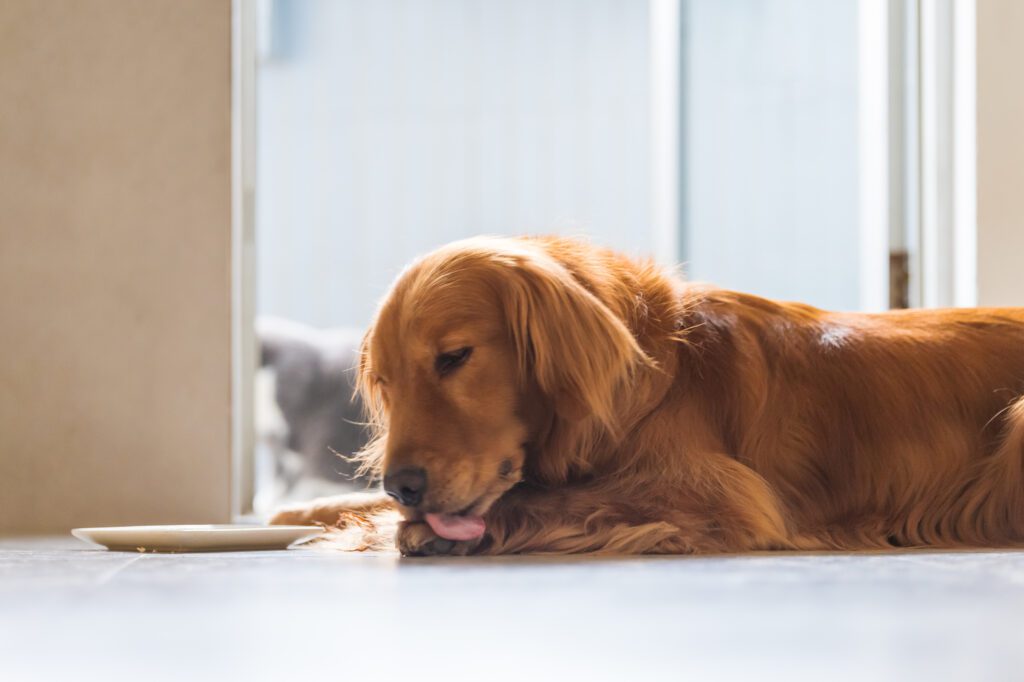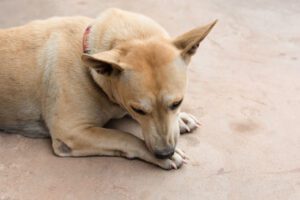Why do Dogs Lick Their Paws in Amesbury, MA?
If you’re a dog owner, you’ve likely observed your furry friend engaging in the curious behavior of licking their paws. While it may seem like a harmless habit, dogs licking their paws can be indicative of various underlying reasons.
In this article, we will explore some common explanations for why dogs lick their paws and provide insights into what you can do to address this behavior.
Allergies and Irritants
One of the most prevalent causes of excessive paw licking in dogs is allergies or irritants. Dogs can be allergic to a wide range of substances, including environmental factors like pollen, grass, or dust mites, as well as certain food ingredients. Licking the paws provides temporary relief from the itchiness and discomfort caused by these allergens.
Dry Skin
Like humans, dogs can experience dry skin, which may lead to itchiness. This can be caused by environmental factors such as low humidity or use of harsh grooming products. Licking the paws is a natural response for dogs to soothe their itchy skin, similar to how we might scratch an itch.

Cleaning
It is possible that your dog could be licking their paws because they’re dirty. While dogs don’t self-groom like cats do, they still tend to lick or chew away any contaminants that are bothering them.
If your dog spends a lot of time playing outside or in the water, then they may lick her paws more frequently to clean them. However, if your dog is mostly an indoor pet, this may not be the potential cause of their paw licking.
Paw Pad Pain or Injury
If your dog is experiencing pain or discomfort in their paws, they may lick them as a way to provide relief or to clean the affected area. Injuries like cuts, scrapes, burns, or foreign objects lodged between the paw pads can all cause irritation and prompt excessive licking.
It is essential to inspect your dog’s paws regularly for any signs of injury or pain. If your dog’s paw pad is seriously injured, take her to the vet right away. This type of injury can quickly become infected and may lead to a serious infection.
Fleas or Ticks
If your dog has a flea problem, they may be licking or chewing their feet because the fleas are biting in this area. Try to keep your pet on a monthly flea preventative to reduce this risk. If your dog does have a flea problem, give her a flea bath and consider taking them to a groomer to help in serious cases.
Ticks may also cause itching and irritation. Check your dog’s paws and between their toes to ensure they don’t have any ticks buried there.
Damaged Toenails
Dogs may sometimes damage their toenails, and this can lead to paw licking as well. If your dog’s toenail becomes cracked or broken, file or trim it down so the ends are not jagged and won’t snag on something. Then, let the broken toenail heal on its own.
If your dog happens to accidentally rip out one of their toenails, this is a serious injury that should be treated right away.

Hot Spots
Hot spots are areas of bacterial or fungal infection on the skin. They are caused by exposure to moisture, and they become irritated and inflamed easily. Dogs chew and lick these spots, which introduces more moisture and bacteria and causes the cycle to continue.
It can be very difficult to treat hot spots. For mild to moderate cases, you can try over the counter hot spot medication from a pet store. For severe cases, however, you may need to talk to your vet about prescription options that can be used topically or orally instead.
Boredom, Anxiety, or Stress
Dogs often exhibit stress or anxiety through repetitive behaviors, and excessive paw licking can be one such manifestation. This behavior can serve as a self-soothing mechanism for dogs experiencing emotional distress or boredom. If your dog doesn’t have enough physical or mental stimulation throughout the day, they may become so bored and restless that they have nothing better to do than lick their paws. Identifying and addressing the underlying causes of anxiety or stress, such as environmental changes or lack of stimulation, can help alleviate this behavior.
Additionally, if your dog has severe problems with anxiety, talk to your vet about options. They may need to try anxiety medication in severe cases. In other, less serious instances of anxiety, training and mental stimulation can help cut down on their anxious behaviors.
Habitual Behavior
In some cases, dogs may develop a habit of licking their paws without any underlying medical or emotional issues. It can start innocently enough but can become compulsive over time. This compulsive behavior may lead to lick granulomas, which are open sores caused by constant licking. Identifying and addressing the root cause of the habit is essential to break this cycle.
Conclusion
While occasional paw licking is considered normal for dogs, excessive or persistent licking should not be ignored. Understanding the reasons behind your dog’s paw licking and taking appropriate action can help address any underlying issues and ensure your furry friend stays happy and healthy. Remember, a veterinarian’s expertise is invaluable in determining the cause and guiding you toward the best course of action for your dog’s specific needs.
If you have any questions regarding your dog’s health, you should always call (978) 388-3074 or book an appointment online!
Recent Posts
About Us
Merrimac Valley Animal Hospital had humble beginnings in 1968. Dr. Walter Brown opened the animal hospital in a garage next to his home near the current hospital and operated out of this small space until the current building was built in 1969.
